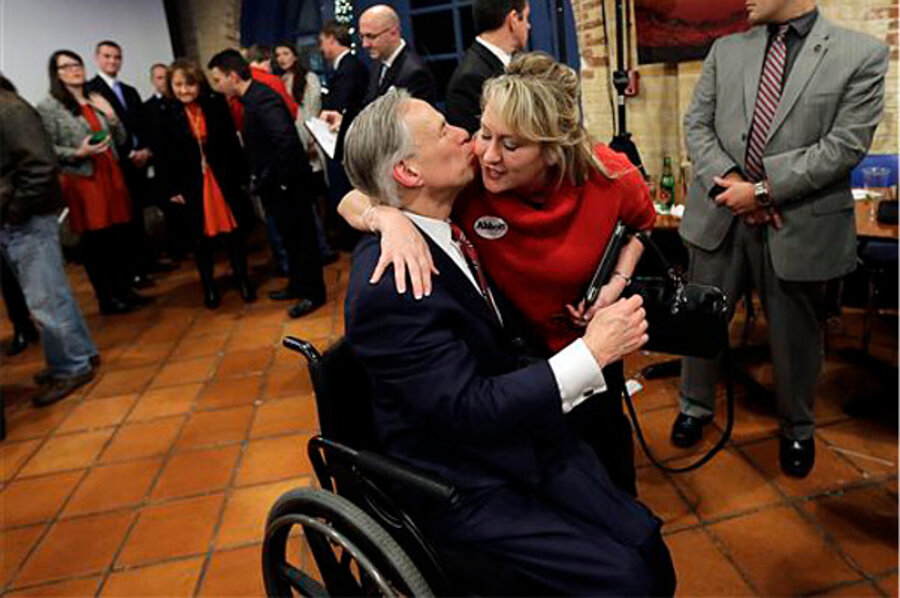Wendy Davis and Greg Abbott set to face off for Texas governor
Loading...
| AUSTIN, Texas
Texas Republicans picked the state's attorney general in the fight to succeed longtime Gov. Rick Perry, while a rising Democratic star coasted to her party's nomination Tuesday night during the nation's first statewide primary.
Warnings about Democrat Wendy Davis' star-making run for Texas governor threatening two decades of Republican dominance dealt complacent conservatives a new reason to vote. So did a rare opportunity to select an entirely new stable of leaders after 14 years under Perry.
Perry's decision to not seek re-election launched a stampede of 26 Republican candidates vying for six of Texas' top offices. Among them was George P. Bush, the 37-year-old nephew of former President George W. Bush and son of former Florida Gov. Jeb Bush, who easily won the nomination for land commissioner in his political debut.
In the first primary since Ted Cruz barreled into the US Senate in 2012 and yanked Republicans nationwide further right, Texas candidates willingly went along. US Sen John Cornyn, who didn't get an endorsement from his fellow Texas senator, routed his primary challenger.
"I say they are not going far right enough," said Marlin Robinson, 56, after casting his primary ballot in Houston. "They need to go further right, as far as I'm concerned because I'm tired of this liberal crap that's running this country."
Attorney General Greg Abbott clinched the Republican nomination for governor and Davis locked up her party's selection, thereby making official a showdown poised to become a record-shattering arms race of fundraising in a Texas gubernatorial election.
In another sign of a rightward drift, state Sen. Dan Patrick, who drew heat from even fellow Republicans for bemoaning an "invasion" of immigrants coming across the Texas-Mexico border, appeared headed for a runoff in the lieutenant governor's race with longtime incumbent David Dewhurst.
Democrats set on breaking the nation's longest losing streak in races for statewide office, meanwhile, hoped a charismatic headliner in Davis would turn out long-dormant voters.
Davis, who catapulted to national political stardom last summer with a nearly 13-hour filibuster over abortion restrictions, is the first female gubernatorial nominee in Texas since Ann Richards in 1994.
Her underdog campaign has raised $16 million so far, with a whopping 91,000 individual donors and big checks from abortion-rights groups.
"If people don't start supporting the Democratic Party and voting as a Democrat, instead of being a Democrat voting in the Republican primary, then we're never going to win races and we're never going to establish ourselves as a serious party here," said Janet Veal, 43, a student adviser at Texas Tech University.
That possibility, and the rising influence of Cruz, has Texas Republicans flanking farther right this primary season. Some pledged to further tighten some of the nation's strictest abortion laws and double down on the state's gay marriage ban — one of several state bans recently ruled unconstitutional by federal courts.
"I think we need to bolster the border security and get tougher on immigration," 38-year-old conservative Republican Glendon Paulk said after voting in Lubbock. "I'm all for people who come over here legally but the illegal immigrants, it doesn't make sense for them to get a break while we're working and having to pay taxes."
Frigid weather greeted some voters with a dangerous drive to the polls. Austin locations opened late because of icy conditions and extended voting for two hours. Turnout was light in many places, with election workers seen knitting or reading a newspaper in between voters' sporadic arrivals.
The last time Texas had so many open statewide seats was 2002, when Perry won his first full term. While Democrats are running mostly unopposed in their primaries, crowded fields in the Republican races for attorney general, comptroller and commissioners for agriculture and railroads make May runoffs likely.
Abbott is the GOP's first new gubernatorial nominee other than Perry to appear on the ballot since George W. Bush in 1998.
Unlike Davis and Abbott, few other Texas candidates have the luxury of uneventful primaries.
Almost all were on the Republican side, where candidates have wooed voters with vows to emulate Cruz's no-compromise style. Even Cornyn and U.S. Rep. Pete Sessions, another powerful Republican who coasted again to the nomination, spent money campaigning against longshot challengers who said the incumbents had grown too moderate in Washington.
Cornyn routed tea party-backed Texas congressman Steve Stockman, who ran a bizarre primary campaign.
Illinois holds the nation's next primary March 18, followed by a flood of state primaries in May and June.
Associated Press writers Will Weissert and Chris Tomlinson in Austin, Juan Carlos Llorca in El Paso, Betsy Blaney in Lubbock, and Ramit Plushnick-Masti and Michael Graczyk in Houston contributed to this report.
___
Follow Paul J. Weber on Twitter: www.twitter.com/pauljweber
Copyright 2014 The Associated Press. All rights reserved. This material may not be published, broadcast, rewritten or redistributed.





